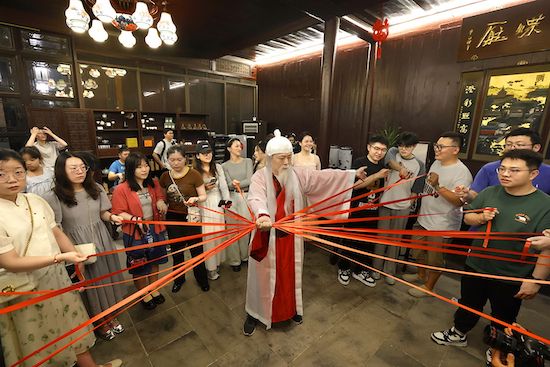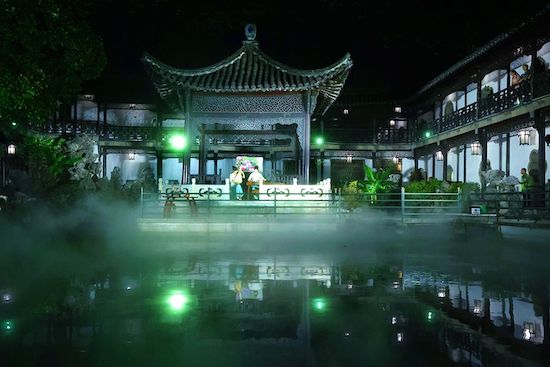A cultural event kicked off on the evening of Aug 9 at Heyuan Garden in Yangzhou, Jiangsu province, in celebration of the Qixi Festival — also known as Chinese Valentine's Day — which fell on last Saturday.
According to Chinese legend, Yue Lao, a deity living on the moon in charge of marriages, binds an invisible red string around the ankles of men and women destined to be soul mates and unite in marriage. At Heyuan Garden, visitors engaged eagerly with Yue Lao, clutching firmly the red string symbolizing fate and beauty.

Visitors engage with Yue Lao at Heyuan Garden, holding the red strings that bond men and women destined to be together. [Photo/yznews.cn]
Beneath the moon's glow, various nighttime performances took turns on stage at the Shuixin Pavilion, including the melodious ensemble music of pipa and guzheng (both traditional Chinese musical instruments), a puppet show, and graceful dance displays, presenting a fusion of traditional Yangzhou performing arts.

A nighttime performance is held at Shuixin Pavilion in Yangzhou. [Photo/yznews.cn]
Another highlight of the event was brought by Li Huajun, an intangible cultural heritage inheritor, who showcased on-site the woodblock printing of Romance of the Western Chamber, a classic Chinese love tale, allowing visitors to experience and appreciate the charm of woodblock printing and traditional culture up close.
In Chinese mythology, the Qixi Festival, occurring on the seventh day of the seventh lunar month, celebrates the annual reunion of Niulang, a cowherd, and Zhinyu, a weaver girl. In ancient times, it was customary for women to practice threading the needle to beseech Zhinyu for a blissful marriage. Today, visitors to the garden were invited to grasp the thread and attempted to pass through the tiny needle holes. Each stitch carried the yearning for a better life and the tender longing for love.